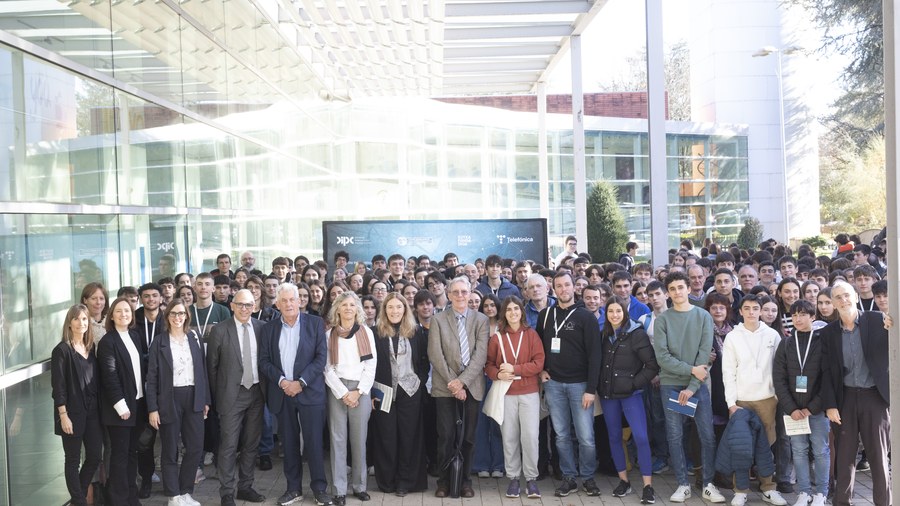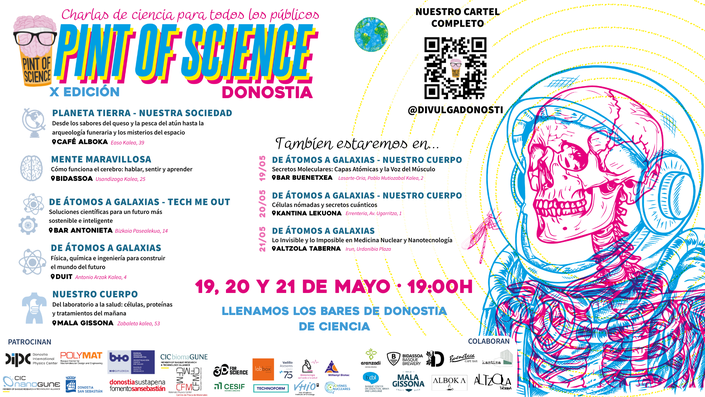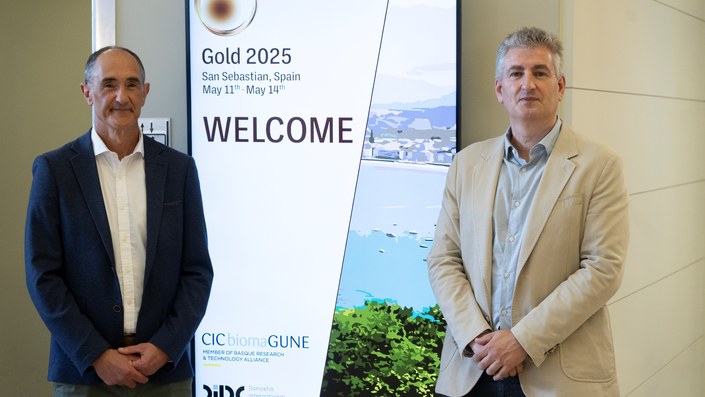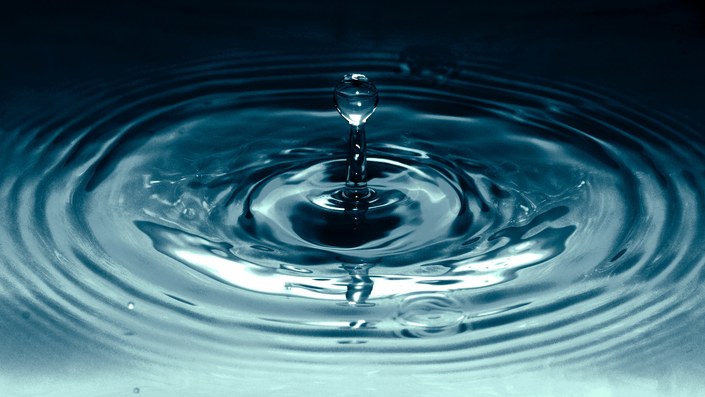Encounters top@DIPC Zientziarekin solasean!
Registration 2025
All the information will be available on this website.

Since 2009, DIPC has been organising large-scale encounters between leading international scientists and Nobel laureates and students from the Basque Country. The event is moderated by Pedro Miguel Etxenike.
The main mission of the encounters is to awaken interest in science and scientific vocations among young people by getting to know first-hand the personal careers and experiences of world leaders in their scientific work. For this purpose, their biographies and career paths are studied in the classroom beforehand. During the event, all registered schools have the chance to ask their questions. The most original and creative question is awarded with the Telefonica prize.
The XV. edition will take place in autumn 2025 in Donostia / San Sebastián.
Programe (morning)
Welcome to students and teachers.
Encounter.
- Institutional welcome and presentation.
- Question and answer session and Telefónica award.
Family photo and snacks: Guests and participants will gather outside the museum for a joint photo.
Closure
Participation conditions:
- Educational centers targeted by the initiative: Secondary schools in the Autonomous Community of the Basque Country, until full capacity is reached (approx. 50/60 schools).
- Participants: One teacher and three/five students from each educational centre that in the 2025/2026 academic year are studying 4th year of ESO or any of the two years of the scientific baccalaureate.
Registration of schools and procedure:
- The registration form will be available on this webpage.
- Places will be allocated in order of registration until full capacity is reached.
- Admitted schools will receive a confirmation email and instructions on how to complete the registration.
- Registration is free of charge.
For further information or to clarify any doubts, please contact us at info@topadipc.eu.
Previous editions
DIPC is honered to have had the participation of the following world-class scientists in previus editions:
Jocelyn Bell-Burnell, astrophysicist, descoverer of the first pulsar, recipient of Breakthrough award in 2018.
Elena Cattaneo, pharmacologist and researcher in stem cells, recipient of “Le Scienze” prize for Medicine and Gold Medal from the President of the Italian Republic in 2001.
Aaron Ciechanover, winner of the Nobel Prize in Chemistry 2004 for the discovery of ubiquitin-mediated protein degradation.
Claude Cohen-Tannoudji, winner of the Nobel Prize in Physics 1997 for the development of methods for cooling and trapping atoms with laser light.
Juan Ignacio Cirac, physicist, pioneer in quantum information theory and quantum computing, recipient of Prince of Asturias award in 2006.
Pamela Diggle, biologist, expert in plant evolution, former president of the Botanical Society of America.
Sylvia Earle, marine biologist and explorer, recipient of Princess of Astuarias award in 2018.
Albert Fert, winner of the Nobel Prize in Physics 2007 for the discovery of giant magnetoresistance.
Pilar Hernández, physicist, expert in elementary particles, member of the Scientific Policy Committee of CERN.
Dudley R. Herschbach, winner of the Nobel Prize in Chemistry 1986 for his contributions concerning the dynamics of chemical elementary processes.
Tim Hunt, winner of Nobel Prize in Physiology and Medicine 2001 for the discovery of key regulators of the cell cycle.
Martin Karplus, winner of the Nobel Prize in Chemistry 2013 for the development of multiscale models for complex chemical systems.
Harold Kroto, winner of the Nobel Prize in Chemistry 1996 for the discovery of fullerenes.
Jean-Marie Lehn, winner of the Nobel Prize in Chemistry 1987 for the development and use of molecules with structure-specific interactions of high selectivity.
María Martinón-Torres, paleoanthropologist, director of Centro Nacional de Investigación sobre la Evalución Humana center, recipient of the Rivers Medal in 2019.
Ginés Morata, biologist, expert in genetics and developmental molecular biology, recipient of Prince of Asturias award in 2007.
Ángela Nieto, biochemist, discoverer of the mechanisms of metastasis, recipient of Rey Jaime I Fundamental Research prize in 2009.
John Pendry, physicist, expert in photonics, creator of the first "invisibility cloak" and the perfect lens, recipient of Kavli prize in nanoscience in 2014.
Heinrich Rohrer, winner of the 1986 Nobel Prize in Physics for the design of the scanning tunneling microscope.
Christophe Rossel, experimental physicist, expert in advanced materials and semiconductors, former president of the European Physical Society.
Mairi Sakellariadou, theoretical physicist specialising in particle physics, gravitation and cosmology, president of the European Physical Society.
Jack Szostak, winner of the Nobel Prize in Physiology and Medicine 2009 for the discovery of how chromosomes are protected by telomeres and the enzyme telomerase.
George F. Smoot, winner of the Nobel Prize in Physics 2006 for the discovery of the blackbody form and anisotropy of the cosmic microwave background radiation.
Jean-Pierre Sauvage, winner of the 2016 Nobel Prize in Physics for the development of molecular machines.
Donna Strickland, winner of the 2018 Nobel Prize in Physics for the development of a method of generating high-intensity, ultra-short optical pulses.
María Vallet-Regí, chemist, leader in research on smart biomaterials, recipient of Rey Jaime I Fundamental Research prize in 2018.
Klaus Von Klitzing, winner of the Nobel Prize in Physics 1985 for the discovery of the quantum Hall effect.
Frank Wilczek, winner of the Nobel Prize in Physics 2004 for the discovery of asymptotic freedom in the theory of the strong interaction.
David J. Wineland, winner of the Nobel Prize in Physics 2012 for his pioneering experimental methods for characterising and manipulating individual quantum systems.
Ada Yonath, winner of the Nobel Prize in Chemistry 2009 for her studies on the structure and function of ribosomes.
Rafael Yuste, neurobiologist and ideologist of the BRAIN project.
Since 2009 top@DIPC encounters have been held in Donostia (Eureka! Zientzia Museo and Victoria Eugenia Theater) and Bilbao (Bizkaia Areto), except in 2020 and 2021. The encounters were orgnanized in the frame of Passion for Knowledge festival in 2023, 2019, 2016, 2013 and 2010, and in 2009 as part of the Atom by Atom festival. Vitoria also hosted the meetings in 2013 within Passion for Knowledge festival.
All videos are available on dipc.tv and DIPC YouTube channel.
Registration 2025
All the information will be available on this website.
There are no events scheduled
Activities
All activities +- Passion for Knowledge
- Cinema and Science Series
- Art and Science
- STROM - Inclusive Astronomy
- Emakumeak Zientzian
- School visits
- On Zientzia
- Kutxa Fundazioa and DIPC
- Crystallization of dance
- Encounters top@DIPC Zientziarekin solasean!
- The San Sebastian Festival with science
- Jot Down Ciencia
- Donostia, Zientzia Hiria
- New Paths of Science
- Pride in Science
- Mestizajes
- Zientzia astea
- El Palo de Eratóstenes
- Aranzadi Astronomy Seminars
- Inspira Bizitzak
- Donostia Week-INN
- Mapping Ignorance
- IKUR Quantum Talks
- Collaborations
- Special events
- Science and Chess
- Kimikoteka
- Bertsozientzia
- Naukas Donostia
- nanoKOMIK
- Albert Einstein
- STEAM Sare: Gravitating Bodies







